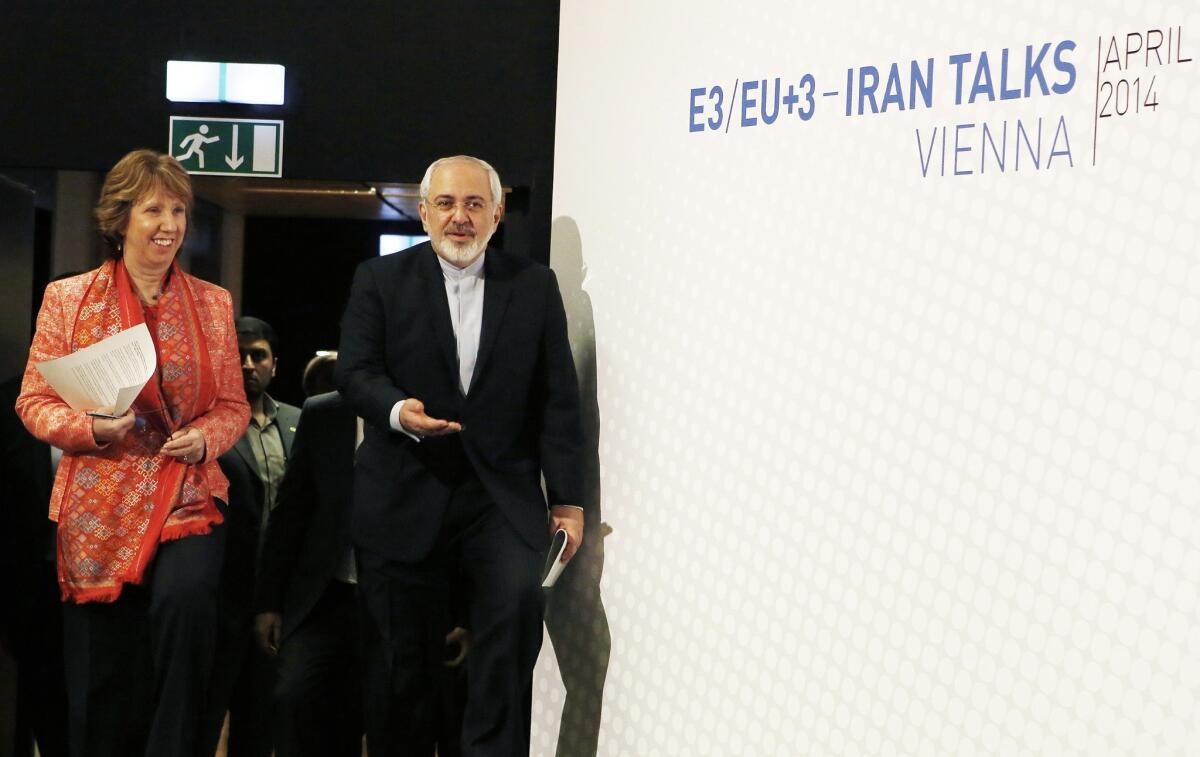IAEA chief: Iran complying with nuclear scale-down commitments

Iran is complying with the terms of an interim nuclear deal with six foreign powers by diluting or converting its stockpile of enriched uranium, IAEA officials confirmed Wednesday. Above, Iranian Foreign Minister Mohammad Javad Zarif and European Union foreign affairs chief Catherine Ashton attend talks in Vienna last week aimed at a permanent nuclear accord.
- Share via
Iran is fulfilling its commitments under a November agreement with six foreign powers to convert or dilute its stockpile of medium-enriched uranium, International Atomic Energy Agency officials reported Wednesday.
“I can tell you, these measures are being implemented as planned,” IAEA head Yukiya Amano told journalists during a visit to Oslo.
In Vienna, diplomats assigned to the United Nations nuclear agency headquarters told the Associated Press that they had seen an IAEA report due out this week confirming that Iran has significantly reduced its ability to make a nuclear weapon by diluting half of its medium-enriched uranium.
The report to IAEA member states also confirms that Iran is on track to convert the other half of its stockpile of uranium enriched to 20% purity into oxide for reactor fuel, the Associated Press reported, quoting the unidentified diplomats.
IAEA monitors play a key role in validating Iranian compliance with the Nov. 24 agreement penned in Geneva, which took effect Jan. 20.
Under the terms of the interim agreement to assure the international community that Iran isn’t seeking to acquire nuclear weapons, Tehran agreed to a six-month moratorium on enriching uranium to 20% purity, a level that can be more quickly upgraded to weapons-quality than the 5%-enriched fuel needed for civilian uses such as energy production.
In exchange for Iran’s scaling back its nuclear capabilities, the six powers -- the United States, China, Russia, Britain, France and Germany -- agreed to release $4.2 billion in impounded Iranian oil revenue over the six-month period of the moratorium.
Iranian Deputy Foreign Minister Majid Takht-Ravanchi told the country’s official Islamic Republic News Agency that the fifth of eight promised installments of funds was expected this week, de facto confirmation that Tehran has fulfilled the pact’s terms for rendering its 440-pound stockpile of 20%-enriched uranium unsuitable for weapons production.
Iran and the six powers are to meet in Vienna in mid-May in hope of agreeing on the details of a permanent nuclear accord that would allow the lifting of all sanctions imposed on Iran over the last decade in punishment for what Western governments perceived as pursuit of nuclear armaments.
Iranian President Hassan Rouhani said in a speech Tuesday that “tough issues” remain to be resolved, but that he was confident a permanent accord could be reached within six months, the Tasnim news agency reported.
Twitter: @cjwilliamslat
More to Read
Sign up for Essential California
The most important California stories and recommendations in your inbox every morning.
You may occasionally receive promotional content from the Los Angeles Times.











